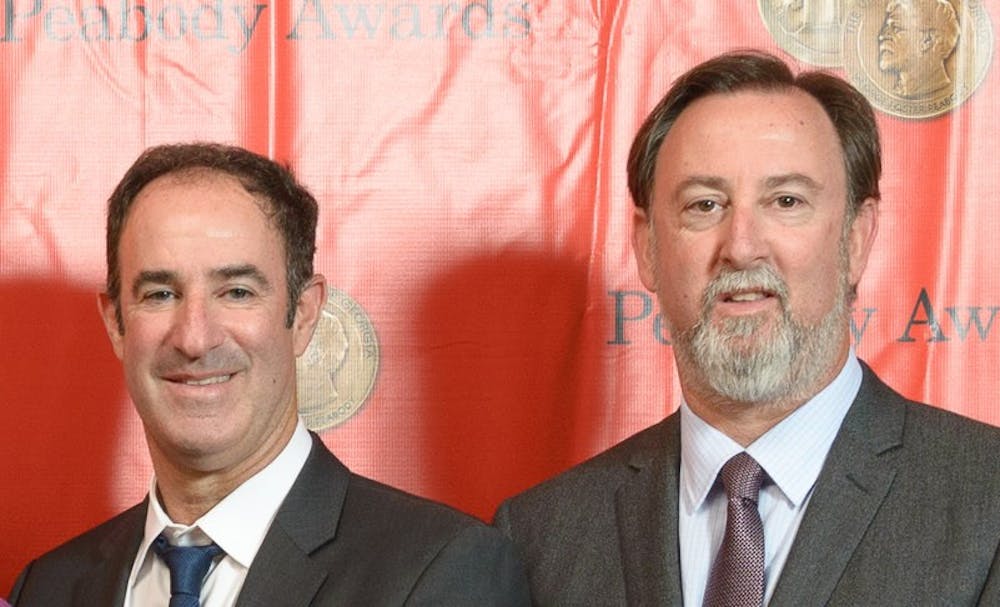On Monday, Nov. 7, Steve Fainaru, Pulitzer Prize winner and investigative reporter at ESPN, sat down with students over dinner to discuss his career in journalism and the intersections between sports and politics.
“Sports are so much of our world, our culture and the way we perceive ourselves,” Fainaru said in the event, which was titled “What Sports Tell Us About the World.”
Fainaru’s career in journalism began at the Boston Red Sox for the Hartford Courant in Connecticut, and later the Boston Globe.
“My entire world was Major League Baseball,” he said of this time.
Fainaru’s coverage of the Boston Red Sox featured not only the team but the fans. His 1991 article on the front page of the Boston Globe, which focused on the relationship between the Red Sox and Boston’s Black community, documented the team’s historic racism and “caused a shitstorm in Boston.”
Fainaru eventually left baseball to return to school, earning a master’s degree in international affairs from Columbia University in 1992. “[Baseball] was glamorous at first, but lost its allure,” he said.
Fainaru served as the Mexico City Bureau Chief, covering Latin American affairs for the Boston Globe between 1995 and 1998. His time in Latin America changed the way that he covered sports. Fainaru began to follow Cuban pitcher Orlando Hernández, nicknamed "El Duque.” In 2001, Fainaru published his first book, “The Duke of Havana: Baseball, Cuba and the Search for the American Dream” on Hernández. At that time, Hernández was a former American League MVP for the New York Yankees.
In 2012, Fainaru wrote “League of Denial: The NFL, Concussions and the Battle for Truth” with his brother, fellow ESPN reporter Mark Fainaru-Wada, investigating brain injuries among NFL players. The book was later adapted into a documentary film for PBS Frontline.

During the question and answer portion of the dinner, Princeton students asked Fainaru about the nature of sports as both an escape for fans and a site of political activism.
“People say you should ‘stick to sports’, for example with [Colin] Kaepernick — people said ‘just play football”, he said. For Fainaru, however, it is vital to “point out uncomfortable truths,” as it “feels disingenuous to ignore this stuff — it permeates the sport”. Fainaru also said that he sees “sports becoming polarized in the same way the country has”.
“It’s hard to know where the world is going,” he said. “We’ll find out more tomorrow night [Election Night] and then in 2024.”
As the discussion came to an end, he encouraged the students to be accepting of the fact that they may not have expertise in everything.

“You’re a stranger generally in these areas of interest and that can go a long way.”
When asked about upcoming projects, Fainaru said that he hopes to finish an investigation in sexual misconduct in Argentine soccer but stressed that he’s focused on teaching here at Princeton and his upcoming book project.
Fainaru is currently a visiting lecturer in the Humanities Council at Princeton, teaching JRN 441: The McGraw Seminar in Writing — What Sports Tell Us about Our World. He described his experience at Princeton as “awesome” and said he was “really enjoying the campus and the culture.”
The event was held on Monday, Nov. 7, in Wilcox Dining Hall from 6:00 –7:15 p.m. and was hosted by Butler College.
Correction: A previous version of this piece stated Fainaru referenced studying as having lost its allure. In reality, Fainaru said baseball lost its allure overtime. The ‘Prince’ regrets this error.
Justus Wilhoit is a news contributor for the ‘Prince.’
Nandini Krishnan is a news contributor for the ‘Prince.’
Please direct any corrections requests to corrections@dailyprincetonian.com.








